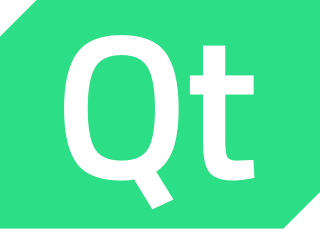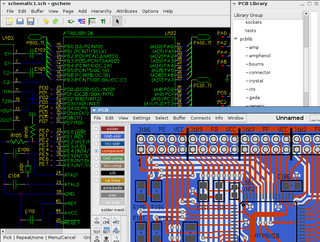
Qt is cross-platform application development framework for creating graphical user interfaces as well as cross-platform applications that run on various software and hardware platforms such as Linux, Windows, macOS, Android or embedded systems with little or no change in the underlying codebase while still being a native application with native capabilities and speed.
In computing, cross-platform software is computer software that is designed to work in several computing platforms. Some cross-platform software requires a separate build for each platform, but some can be directly run on any platform without special preparation, being written in an interpreted language or compiled to portable bytecode for which the interpreters or run-time packages are common or standard components of all supported platforms.

DTrace is a comprehensive dynamic tracing framework originally created by Sun Microsystems for troubleshooting kernel and application problems on production systems in real time. Originally developed for Solaris, it has since been released under the free Common Development and Distribution License (CDDL) in OpenSolaris and its descendant illumos, and has been ported to several other Unix-like systems.

TrueOS is a discontinued Unix-like, server-oriented operating system built upon the most recent releases of FreeBSD-CURRENT.

GCompris is a software suite comprising educational entertainment software for children aged 2 to 10. GCompris was originally written in C and Python using the GTK+ widget toolkit, but a rewrite in C++ and QML using the Qt widget toolkit has been undertaken since early 2014. GCompris is free and open-source software and the current version is subject to the requirements of the AGPL-3.0-only license. It has been part of the GNU project.

The term gEDA refers to two things:
- A set of software applications used for electronic design released under the GPL. As such, gEDA is an ECAD or EDA application suite. gEDA is mostly oriented towards printed circuit board design. The gEDA applications are often referred to collectively as "the gEDA Suite".
- The collaboration of free software/open-source developers who work to develop and maintain the gEDA toolkit. The developers communicate via gEDA mailing lists, and have participated in the annual "Google Summer of Code" event as a single project. This collaboration is often referred to as "the gEDA Project".

The Sleuth Kit (TSK) is a library and collection of Unix- and Windows-based utilities for extracting data from disk drives and other storage so as to facilitate the forensic analysis of computer systems. It forms the foundation for Autopsy, a better known tool that is essentially a graphical user interface to the command line utilities bundled with The Sleuth Kit.
The Snack Sound Toolkit is a cross-platform library written by Kåre Sjölander of the Swedish Royal Technical University (KTH) with bindings for the scripting languages Tcl, Python, and Ruby. It provides audio I/O, audio analysis and processing functions, such as spectral analysis, pitch tracking, and filtering, and related graphics functions such as display of the sound pressure waveform and spectrogram. It is available on Microsoft Windows, Linux, Mac OS X, Solaris, HP-UX, FreeBSD, NetBSD, and IRIX.

fpGUI, the Free Pascal GUI toolkit, is a cross-platform graphical user interface toolkit developed by Graeme Geldenhuys. fpGUI is open source and free software, licensed under a Modified LGPL license. The toolkit has been implemented using the Free Pascal compiler, meaning it is written in the Object Pascal language.
Enthought, Inc. is a software company based in Austin, Texas, United States that develops scientific and analytic computing solutions using primarily the Python programming language. It is best known for the early development and maintenance of the SciPy library of mathematics, science, and engineering algorithms and for its Python for scientific computing distribution Enthought Canopy.

A Unix-like operating system is one that behaves in a manner similar to a Unix system, although not necessarily conforming to or being certified to any version of the Single UNIX Specification. A Unix-like application is one that behaves like the corresponding Unix command or shell. Although there are general philosophies for Unix design, there is no technical standard defining the term, and opinions can differ about the degree to which a particular operating system or application is Unix-like.
Orthanc is a standalone DICOM server. It is designed to improve the DICOM flows in hospitals and to support research about the automated analysis of medical images. Orthanc lets its users focus on the content of the DICOM files, hiding the complexity of the DICOM format and of the DICOM protocol. It is licensed under the GPLv3.







